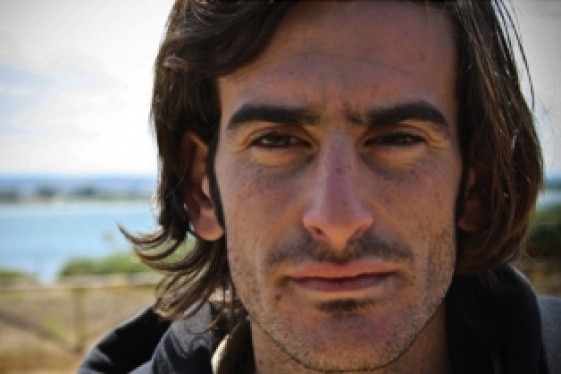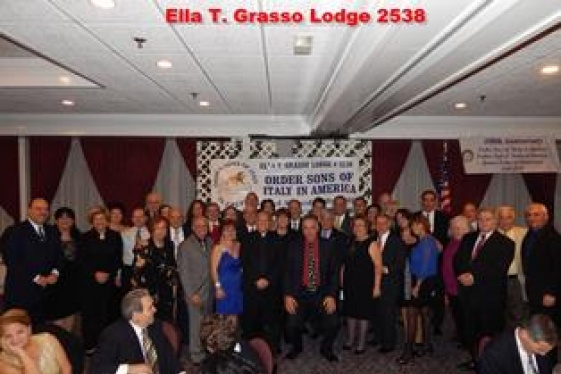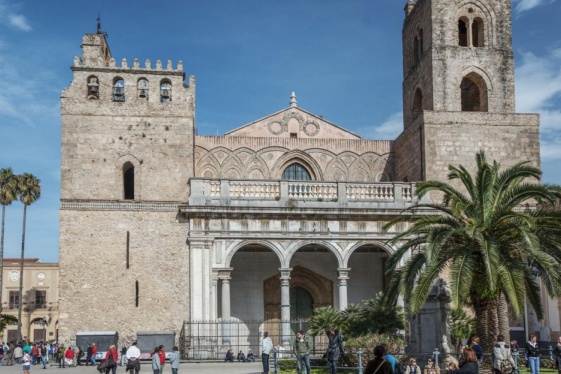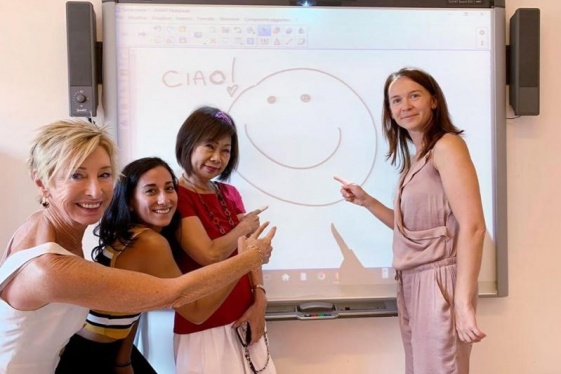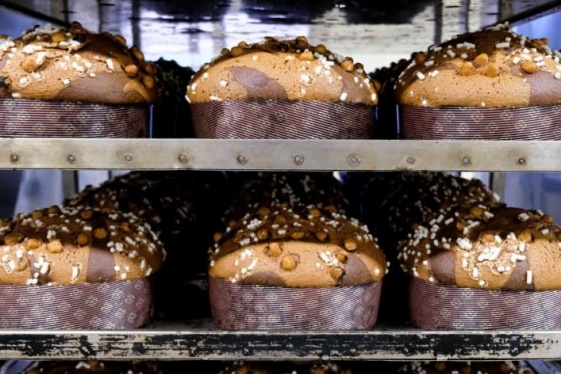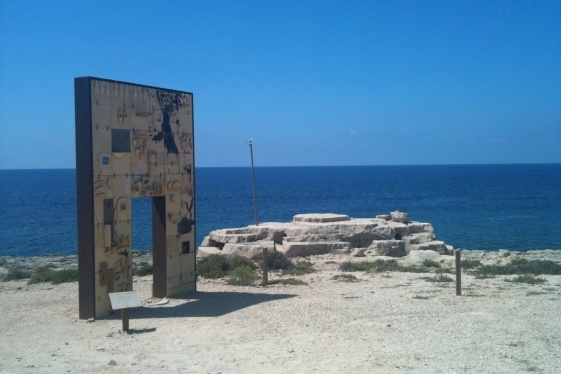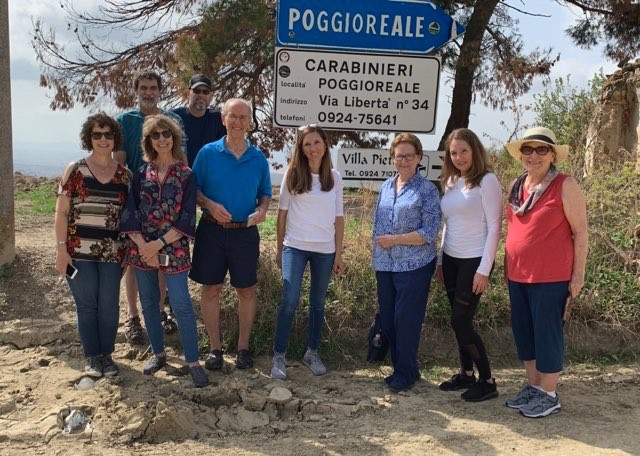

BY: Sarah C. Hallier
Stereotypes exist in so many forms, and none so comedic as the Italian nose.
I remember the moment my elementary school nose began to show off. Minutes turned into months turned into years, and the nose just kept growing. I vividly recall staring in the mirror, confidently trying to find my best angle, only to realize that my nose took center stage at a party in which she wasn’t invited.
But the moment I stepped off that long flight from San Francisco to Palermo, jet-lagged, wide-eyed, inhaling the contradictory scents of musty cigarettes and Tyrrhenian sea breeze, I felt that something had changed inside of me. My nose was no longer the uninvited guest. It was the life of the party, and I knew that I was no longer in America. I had come home.
Poggioreale, Sicily is hard to find on a map. In fact, sometimes it’s just completely left off. I found this out the hard way when my mother, a genealogist before genealogists were a thing, first discovered that my father’s grandfather emigrated from the tiny town of Poggioreale, located on the western side of Sicily. Far from the touristy eastern coast, through miles of hundred (maybe even thousand) year old olive orchards, it wasn’t difficult to see why Poggioreale is sometimes missing from the map. But somehow, almost 150 years ago my great great grandfather, a peasant whose family lived in the citta for centuries, mustered the courage to persuade his wife and two young children to join him on the journey of a lifetime. They packed their few belongings and trudged off for the port of Palermo, a dusty trek that took the better part of two days, eventually setting sail for an unknown country advertised as “streets of gold” and “jobs on every corner.” Over the long decade of the 1880s, three siblings, countless aunts and uncles, and a myriad of cousins followed my great great grandfather to America, settling for flood-prone land in the Brazos Bottoms of Texas. Many of their stories have been passed down over the generations. Many of their stories have also been forgotten, lost in the creases of their faces and the laboring work only known to first-generation immigrants in a foreign land. So when my siblings, mother, and I had the opportunity to travel back to Poggioreale for the first time last autumn, it didn’t take long for us to realize that we would not be who we are today without the grit and grind these ancestors endured.
We learned that we are not just American; we are also Sicilian. And we wouldn’t have it any other way.
Poggioreale in America
Our eclectic tour group, made up mostly of Texans and Californians who were all somehow related and definitely proud to show off their noses, belong to an organization called Poggioreale in America, or PIA. PIA is dedicated to connecting generations of Sicilians in America and Australia whose ancestors emigrated from the town of Poggioreale. The group also focuses on oral stories, photographs, genealogical records and archaic church documents, always relishing each other’s new discoveries of old family tree lines. Our recent trip to Poggioreale was PIA’s first group tour in years, and our experience is one that most Americans may never have thought could be an actual reality. We walked backward into time, retracing our great grandparents’ steps, reliving their fears and dreams and loves, and getting to know the faces of the families they left behind. We all arrived in Sicily feeling like proud Americans. But we had no idea that pieces of our ancestors’ hearts were left behind so many years ago. The inquisitive smiles peaking out at us behind their cappuccinos were actually the voices of our ancestors softly calling us home.
Our First Taste of Sicily
We first realized we were no longer in America during our van ride from the bustling yet antiquated capital of Sicily – the romantic seaside town of Palermo. Arguably the most conquered town in the history of the world, Palermo offers tourists and townspeople alike the opportunity to see what thousands of years of war, an unfair class system, the Italian government, and mafia can do to a place. The journey that dark night from the airport took no longer than an hour, but the desolate and empty wheat fields, resting from their glory days of harvest, told a ghostly tale of the sinister side of these lands. Maybe it was the way the moonlight shone on our tired faces through the windows, or the slow realization we had no idea what we had just signed up for. We had ten days of unknown chaos in front of us. And in that hectic moment in our bumpy, overcrowded and swampy van on the unfamiliar Sicilian highway, the never ending, twisting road to nowhere somehow beckoned us. We could not foresee that we were about to fall in love with a ghost town, far from home and void of American niceties, yet filled with alive and thriving relatives who welcomed us with open arms.
The Earth Rumbled and Everything Changed
Due to a devastating earthquake in the Belice Valley of Sicily in the winter of 1968, the original, once thriving, medieval village of Poggioreale (now usually referenced as Poggioreale Antica) was eventually abandoned and left to rot in the sizzling Sicilian sun. The government explained that that the damaged town was beyond repair, and the only solution was to rebuild. What may have seemed like a win-win alternative to living in the powerless and crumbling old city on the hill, the people of Poggioreale told us a different story – one that hovered somewhere between mafiaoso folklore and Sicilian pride. The new town of Poggioreale was built over the next 15 years, funded by the Italian government. Evident by the new town’s overwhelming grey coldness and its modern architecture, the concrete “unions” clearly had a say in where the money was spent. By day, the tired families hiked the two-mile trail up to the old town – to make breakfast and spend their days pretending life would eventually get back to normal. By night, as the western winds whistled through the low hills, they took their broken spirits back down to the government barracks that taunted them with power and warmth. As months turned into years, the realization that their old way of life had vanished became a hard reality. The new town offered government housing and a chance to start over. Fifty years later, the old town up on the hill still whistles their names and their hearts. It was calling ours, too. It was just in Sicilian, and we didn’t understand it yet.
The Trip of a Lifetime
Our nine nights spent in the new town of Poggioreale were some of the most memorable times of our lives. Our morning venture to the local bar offered us the chance to sit with the locals, leisurely sipping our cappuccinos with pistachio croissants, something Americans couldn’t possibly have time for back in the States. By day three, still unsure of the customs and expectations of this ragged yet spirited city of 700 (although the barren streets and abandoned homes made me think it was actually closer to 500), we waited for eye contact to say it was okay to approach. In their thick and “schooshy” Sicilian language (please don’t call it a dialect), the retired men of Poggioreale told us their stories. Some eagerly joined us in the piazza, oversized family portraits in hand, salvaged from the walls of their family homes after the earthquake. The familiarity in their noses and their last names made us smile and eased the discomfort from a language barrier we wished we hadn’t brought with us. Through the wiff of their smokes and the grins on their aged faces, we shared a commonality almost impossible to put into words, regardless of the two languages that clashed. We shared blood, and survival, and a misunderstood need to figure out why we had come. And why they had stayed. Our connection will last a lifetime. Our conversations, though broken and funny and loud, sat comfortably in a corner of our minds, ready for more.
And more is what we got! Nine days in Sicily couldn’t possibly be enough, but we made the most out of every moment. From the cathedrals of Palermo to the Ancient Greek ruins of Agrigento, our bus driver Peppa (possibly the most beautiful nose in all of Sicily) and our tour guide, Rosario (possibly the kindest man in all of Sicily), pulled us away from our morning conversations at the bar, only to show us something better than the day before.
The island was enchanting. The people invited us into their homes, cooked us authentic Sicilian cuisine, introduced us to their families, and walked us to the pub at night, arm in arm, google translate in hand, laughing at jokes we were sure we understood but probably didn’t. We got to know a side of this underrepresented town where time has stood still in a way that most tourists could only dream. Our last names seeped out of the concrete homes of the new town, inching closer to the missing branches of our family trees. The Campisis and Todaros and Tondolas and Caronnas were all still there – relatives of our great grandparents who had stayed behind for reasons we may never know, and could only fully appreciate after spending time there. And each day we unpeeled their stories, 150 years of families who still call Poggioreale their home today.
Poggioreale Antica: Modern Day Ghosts
If the new town met expectations we hadn’t fully dissected and prompted us to talk and ask and connect, the old town silenced us. The bus ride up the hill, past the cemetery where our sleeping ancestors watched and smirked, was quiet. Our PIA trip centered around these few hours in Poggioreale Antica, and I don’t think I have ever wanted something so much. With map of my great grandfather’s old city in hand, the anticipation taunted our senses and sent our thoughts in a tailspin of excitement and disbelief. This was our moment. All 15 of us, with our mangled family trees and tangled DNA connections, knew that as far back as one could document, this is where our ancestors had raised their families. This is where they had shared tears and triumphs, births and deaths and hardships that not even one of us could relate to. This is where they said goodbye to family they would never see again. And as we walked forward towards our ancestors broken and crumbled homes, our footprints told the story of our families’ departures. We walked forward, slowly inching our way into their past. I will never forget that feeling, and I have never felt such peace. My ancestors came and went and their decisions made me who I am today. I gave homage to their struggle and their bravery, and walked back out of there knowing it would always be a part of me.
Despite our emotional connection to Poggioreale Antica, the reality of its physical structure haunted me more than my ancestors’ unknown reasons for leaving. Regardless of their plight and struggles, the town must have been stunning in its heyday. The outlines of the cobbled streets and the flecks of blue paint still peeling from the dilapidated walls of their kitchens are etched in time. January 15, 1968 was a turning point in this town’s livelihood and future. And although most of our ancestors had left 50 years or more before the earthquake, it was still painful to see what had become of the townspeople – our family’s cousins who were forced to pick up the pieces and move on to a new way of living. The new town gave them a chance to continue living, but what it took from their souls has yet to be recovered.
Moving Forward
I don’t know what the future holds for the new town of Poggioreale. With the average age well over 60, and many young people understanding the importance of education on the mainland, I’m unsure where this community will land in ten more years. Regardless, what we felt and what we saw in Poggioreale was something so familiar. The faces of the Poggioreale people are faces of survival and of reinvention. And most importantly, they are the faces and the noses of our grandparents, smiling at us and happy to see us come home. The people of Poggioreale showed me the importance of family in a way I had not yet discovered. I cannot wait to take my children back there, endearing concrete walls and all, to feel what I walked away with – friendships and family for life.
We are Americans of Sicilian descent. And no amount of American naïveté or expectation could ever diminish the connections we made in Poggioreale over those ten days. The ghosts of our past met the strength of Poggioreale Nuovo, and our lives were changed forever. Our noses, however, will never change. And for the first time in my life, I don’t want mine to.
You may be interested
-
Davide Gambino è il miglior "Young Italian F...
Si intitola Pietra Pesante, ed è il miglior giovane documentario italiano, a detta della N...
-
Italian American Culture Night
Tuesday, April 14 - 6.30 pm EDTSt. James Church Rocky Hill - 767 Elm St, Rocky Hill,...
-
'A beacon of hope': Sicily’s enduring North A...
On a late summer evening in the Sicilian seaside village of San Vito Lo Capo, Anna Grazian...
-
'Italy Stay Strong': What The Coronavirus Eme...
On the northern coast of Sicily, looking out toward the magnificent Aeolian Islands, Milaz...
-
'Open-air museum' in Sicily with contemporary...
The Foundation Orestiadi in Gibellina is launching the first open-air exhibit in Sicily si...
-
'People thought I was crazy:' The Sicilian ma...
When thinking of Sicily, it's easy to imagine white sandy beaches, timeless architecture a...
-
'Porta d'Europa' ('Gateway to Europe')
BY THE AIRPORT ON THE tiny Italian island of Lampedusa, near the ruins of bunkers and mili...



